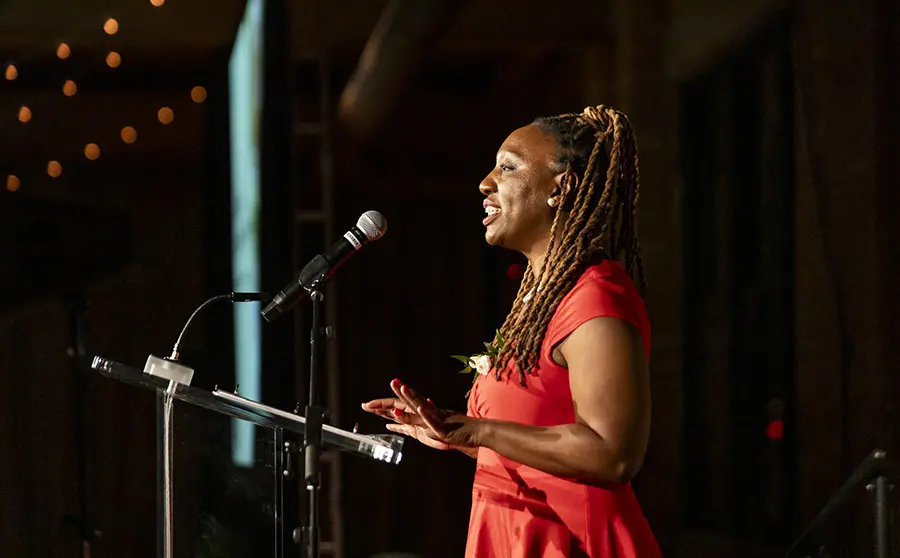
April 25, 2024
At the Shriver Center on Poverty Law, we focus on multiple issue areas, but I always say community and family justice is the heart of the work. And I say that because keeping families together and communities strong is the goal of our work in all our issue areas.
That’s why I spoke about the importance of supporting children, working families, and communities earlier this month at our 2024 Annual Gala: Changing Rules. Changing Lives. Our event, which drew hundreds of people to the Bridgeport Art Center, gave me the opportunity to highlight a critical issue in front of changemakers who share our vision to end racism and poverty in the country.
Poverty is woven into the very fabric of our nation, with the rules designed to keep people stuck in the situation where they started life. And it creates adult-sized worries for children that affect their ability to thrive. They worry where their next meal will come from. They worry whether they will have a roof over their heads next month. They worry if they will have to move again. They worry about making new friends at the new home.
The two factors that determine whether a child will live in poverty as an adult are where they’re born and their parents’ income. Not how much promise they show. Not how hard they work. Not how passionate and determined they are. Not how many gifts they have.
Right now, families are being watched and investigated for the way their children show up — if their clothes are dirty or there’s instability in their housing. The cause is not always abuse. Sometimes it is because their parents lack the resources to meet their children’s basic needs. Poverty doesn’t equal neglect.
During the pandemic, the federal child tax credit reduced child poverty by almost half. In 2021, provisions in the American Rescue Plan Act prevented millions of children from experiencing poverty. This assistance expired in 2022, along with the end of other benefits. It’s no surprise the number of children living in poverty more than doubled in just one year. Now, nearly 9 million American children live in poverty.
Instead of making investments in families like an improved child tax credit, the system makes the choice to rip families apart, traumatizing children, parents, and entire communities. We made these investments during the pandemic because it was an emergency. Having 9 million American children live in poverty is an emergency too. We need to make investments now.
The government takes a child away from their parents, community, and support network, placing them with a non-relative foster family, who then gets $900 a month to care for the child. If we have $900 to give to support raising this child, why aren’t we giving it to the parents? This is why we continue to advocate for guaranteed income programs.
The child welfare system is a highway to homelessness. An estimated 20 percent of young adults who are in the foster system become homeless when they turn 18. Preventing children and youth from entering the system would reduce homelessness rates.
Child welfare is just one example of rules that are set up to disproportionately impact Black and Indigenous children. Black children are almost twice as likely to be under investigation and be taken away from their families. Nationwide, American Indian and Alaskan Native children are overrepresented in state foster systems at a rate 2.66 times greater than their proportion in the general population.
Laws that create and perpetuate poverty and inequity are rooted in structures and systems. People experience poverty differently based on their race and other marginalized identities, but all are denied dignity and freedom by barriers designed to harm certain groups while advantaging others. And because the systems were created with race in mind, the solutions must keep race in mind, so we truly help the people who are most affected.
As part of our work to develop these solutions, it has been a great honor to be appointed by Gov. J.B. Pritzker to the state’s Racial Disproportionality in Child Welfare Task Force. The task force partners with the Illinois Department of Children and Family Services (DCFS) and Lutheran Child and Family Services of Illinois, along with lawyers, advocates, private agencies, public agencies, parents and legislators, to explore ways to improve outcomes for Illinois families.
As we say at the Shriver Center, poverty is a policy choice, and we can make better choices. The task force is pushing for reforms that will invest in family well-being instead of penalizing families for being poor. This summer, the task force, which released reports in 2022 and 2023, will share its final recommendations.
One of the task force’s ideas has already resulted in a change within Cook County. The county now permits parents to have an attorney as soon as the investigation starts. This policy could and should be implemented statewide and across the country.
Much more work remains to reallocate resources and create more laws that prioritize family preservation over the removal of children from their homes. As we continue to help maintain the necessary support networks, we will keep working in partnership with grassroots leaders and community champions. These everyday warriors have the answers to our communities’ issues and work tirelessly to make their neighbors’ lives better.
There’s no substitute for lived experience. In all advocacy efforts, we will continue to elevate community voice and expertise by co-designing solutions with people who have been impacted by the systems we’re trying to change.
Our policies and laws must value families, center communities, and end racial inequities.